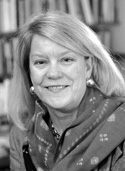Religious consciousness rises in U.S.
Eck looks at Post-Sept. 11 attitudes in U.S.

On Sept. 15, four days after terrorist attacks in New York and Washington, D.C., Balbir Singh Sodhi, a Sikh immigrant from India, was shot to death while he worked on landscaping outside his Chevron station in Mesa, Ariz.
Frank Silva Rocque, charged with murder in the case, reportedly screamed at police when they came to arrest him, “I am a patriot!”
A week after the shooting, 3,000 people – Christians, Jews, Muslims, and Sikhs – gathered for Sodhi’s funeral and expressed their sympathy and outrage at the killing. Words of sorrow were written on a long canvas in English, Spanish, and Arabic. In the months that followed, 10,000 people flooded the family with letters, notes, and e-mails of sympathy.
The Sept. 11 terrorist attacks have brought out both the worst and the best in America, according to Professor of Comparative Religion and Indian Studies Diana Eck. Violent xenophobia has been counterbalanced by a desire to understand people who some of us didn’t even know were part of our community.
Eck spoke to about 80 administrators at the Harvard Administrators’ Forum in the Barker Center last Wednesday (Feb. 6). The Harvard Adminstrators’ Forum is a voluntary organization of administrators dedicated to finding ways to share information across school and department boundaries.
Eck said the Sept. 11 tragedy has awakened many Americans to the reality of a religious revolution that has been transforming their nation for some time. Joining the traditional Christian and Jewish communities in this country have been Muslims, Sikhs, Hindus, Buddhists, Jains, Shintoists, and people practicing a wide variety of other religions. While these new immigrants have been slowly taking their places in the United States for some time, Sept. 11 caused many Americans to sit up and take notice.
“The catastrophe of Sept. 11 brought to the country a new level of consciousness of the religious transformation America is undergoing,” Eck said. “People are surprised to find more Muslims than Episcopalians and about the same number as Jews. A new era really began for all of us.”
Before talking about Sept. 11’s impact on religious America, Eck took some time to set the stage, highlighting the many religious communities that make up the United States. And though immigration in recent decades has changed the face of the nation, most of these world religions have been in America for some time. Islam, for example, was the religion of an estimated 10 percent of Africans brought to America during the slave trade, Eck said.
Hate crimes are also nothing new to America, she said. Local zoning boards have been a common battleground, as neighbors fight proposed mosques and Buddhist temples proposed for their neighborhoods. Vandalism and arson have also been a familiar part of the new American religious landscape.
Sodhi’s death was one of the most widely publicized hate crimes in a wave that swept the country following Sept. 11. Ranging from racial and ethnic slurs to outright murder, the targets of these crimes were often of religions and nations not associated with Osama bin Ladin’s radical Islam. Sodhi, a Sikh who had immigrated from India 10 years before, was most likely killed because he wore the turban and long beard favored by many Sikhs.
“Mr. Sodhi was apparently killed for no other reason than because he was dark-skinned, bearded, and wore a turban. He was killed because of hate,” Maricopa County attorney Rick Romley said during a press conference after the shooting.
Eck said there has been a silver lining on the dark cloud of hate crimes. As in Sodhi’s case, in response to nearly every incident, neighbors have rallied, condemning the crimes and flooding the victims with sympathy and goodwill. On a more institutional level, Sept. 11 has prompted religious leaders to reach out to each other across religious boundaries, setting up interfaith councils and other efforts to understand each other.
“The other side of the story is an important one. That is for almost every one of those (hate crime) instances there’s a tremendous response from the community that says, ‘This is not who we are,’” Eck said. “The past five months has seen an unprecedented level of discourse in America.”
That reaching out is cause for hope, Eck said. Often instances of hate crimes are motivated by ignorance of another’s way of life and beliefs. Perpetrators are motivated by fear of change and their violence is directed at what they don’t understand.
“The issue is often not raw prejudice but sheer ignorance,” Eck said. “One of the things we’ve learned after Sept. 11 is how much we in America are ‘get busy and learn’ kind of people.”
While the terrorist attacks have prompted a high level of exchanges among different religions, it remains to be seen what road America will take, Eck said, now that it’s awakened to the new religious reality.
“It’s too soon to gauge the climate of the new religious America that we all now live in,” Eck said. “This really is the question: Are we going to have multifaith groundbreakings or hate crimes and arsons?”




